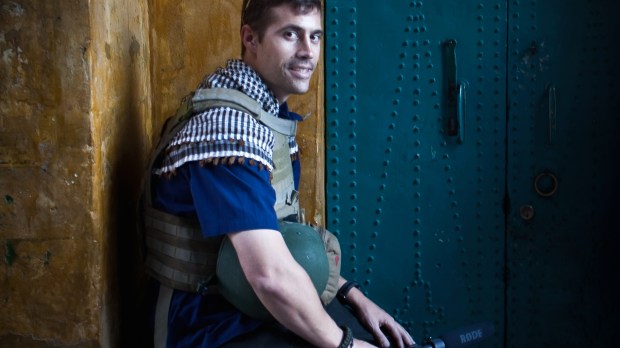Names can be ephemeral things, so one could easily be forgiven for not immediately recognizing the name of James Foley. However, bring up the fact that Mr. Foley was the American photojournalist whose gruesome beheading was broadcast to the world by ISIS, and most people will remember him immediately. Sad to say, due to the horrendous nature of the act, the whole world knows how James Foley died. The new HBO documentary, Jim: The James Foley Story, would rather we focus on how he lived.
The film opens with a clip of Foley giving a speech at Marquette University, the Jesuit-run college from which he attained the first of his degrees. He was invited to speak there after writing a letter to the university expressing his gratitude for the support it provided during his captivity in Libya in 2011. It was in that missive that Foley explained how he and a fellow captive prayed the rosary to maintain their hope and sanity. “It took a long time, almost an hour to count 100 Hail Marys off on my knuckles,” Foley related, “and it helped to keep my mind focused.”
This activity eventually led to Foley praying alongside his Muslim cellmates. This caused a bit of confusion when, having washed himself at their request, they declared him a convert to Islam. Foley tried to explain that he was praying to Jesus, but it didn’t seem to matter to the Muslims, so Foley let it go in the name of keeping peace inside the cell. “From then on out, I prayed with them five times a day,” he told the audience at Marquette. “But it was difficult. I was thinking, ‘Jesus, am I praying to Allah? Am I violating my belief in you?’ I don’t have an answer to that, I just know that I was authentically with them, and I was authentically praying to Jesus. I don’t know theologically. But I thought I was being authentic.”
If one thing becomes clear over the course of the documentary, it’s that James Foley had two primary concerns in his life: his faith and his calling to help others. Both took root in the small New Hampshire town where he grew up as the oldest of five children in a very Catholic family. After graduating for the first time, Foley volunteered for Teach for America, a program that recruits college graduates and professionals to tutor in inner-city and rural communities. Unsatisfied with his performance as a teacher, Foley turned his sights toward a new calling, photojournalism.
The documentary introduces us to a number of Foley’s fellow photogs who worked with him in various warzones. While the job does indeed attract its share of thrill seekers, Foley’s comrades indicate he was motivated more by a desire to bring attention and much needed aid to the people impacted by the ongoing hostilities. They relate with much admiration, and a little amusement, Foley’s single-minded campaign to secure an ambulance for a small medical facility he stumbled upon during one of his shoots. Of course, it was just such actions that would inevitably draw notice from terrorists looking for hostages.
In November 2012, Foley, along with journalist John Cantlie, was kidnapped by ISIS. As with his first captivity, Foley turned to his Catholic faith to sustain both himself and his cellmates during the long months to follow. His fellow prisoners note how Foley was always there to break up fights, concoct little entertainments or provide whatever care he could after torture sessions.
One of the hostages notes with some awe how Foley was the only person out of the 19 men in the cell who never once hid food from the others. As one of Foley’s fellow prisoners explains, “We lost all hope in captivity, but James didn’t. He saw the light, instead of the dark.”
In 2014, while all of the other men were freed, Foley was singled out for execution. Part of that decision was likely due to the United States’ refusal to pay a ransom, but personally, I can’t help but wonder if part of it was an attempt to extinguish that hope and light Foley carried with him at all times. This documentary wants to make sure that doesn’t happen. I hope it succeeds.
In a world he didn’t create, in a time he didn’t choose, one man looks for signs of God in the world by … watching movies. When he’s not reviewing new releases for Aleteia, David Ives spends his time exploring the intersection of low-budget/cult cinema and Catholicism at The B-Movie Catechism.

